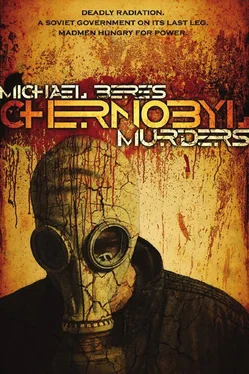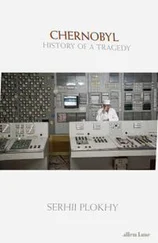Michael Beres - Chernobyl Murders
Здесь есть возможность читать онлайн «Michael Beres - Chernobyl Murders» весь текст электронной книги совершенно бесплатно (целиком полную версию без сокращений). В некоторых случаях можно слушать аудио, скачать через торрент в формате fb2 и присутствует краткое содержание. Жанр: Триллер, на английском языке. Описание произведения, (предисловие) а так же отзывы посетителей доступны на портале библиотеки ЛибКат.
- Название:Chernobyl Murders
- Автор:
- Жанр:
- Год:неизвестен
- ISBN:нет данных
- Рейтинг книги:4 / 5. Голосов: 1
-
Избранное:Добавить в избранное
- Отзывы:
-
Ваша оценка:
- 80
- 1
- 2
- 3
- 4
- 5
Chernobyl Murders: краткое содержание, описание и аннотация
Предлагаем к чтению аннотацию, описание, краткое содержание или предисловие (зависит от того, что написал сам автор книги «Chernobyl Murders»). Если вы не нашли необходимую информацию о книге — напишите в комментариях, мы постараемся отыскать её.
Chernobyl Murders — читать онлайн бесплатно полную книгу (весь текст) целиком
Ниже представлен текст книги, разбитый по страницам. Система сохранения места последней прочитанной страницы, позволяет с удобством читать онлайн бесплатно книгу «Chernobyl Murders», без необходимости каждый раз заново искать на чём Вы остановились. Поставьте закладку, и сможете в любой момент перейти на страницу, на которой закончили чтение.
Интервал:
Закладка:
Dmitry stood and walked to the back door.
“Where are you going? I was speaking!”
“I’ve heard this story before, Pop.”
“No. You… you couldn’t have.”
“I have. And so has Mom. You always talk about Gretchen when you’re drunk. You always tell us how she was murdered and what a hero you were to have avenged her death. You’re drunk like this every night. Go ahead. Try to stand up. See? You can’t. You don’t know what you’re talking about. There are no Gretchens here.
I have my own friends. Telling me about the old days in Berlin when you used your whore, Gretchen, to lure poor bastards to be tortured doesn’t mean anything here. Maybe you killed the bastards she brought to you. Why don’t you get your gun and kill me? You can’t even get out of your chair!”
Komarov reached into his pocket and pulled out the knife. Before he could open it, Dmitry snatched it away.
“Ha! A knife! You pull a knife on your own son?”
Dmitry opened the knife, held the blade up to the light coming from the window. “Such a big knife for such a little man.” Then Dmitry stabbed the knife into the door frame and went into the house, leaving the back door to slam shut like the shot from a pistol.
Komarov held the arms of his chair and twisted to stare at the knife sticking out of the door frame, the knife he’d used so he could be where he was today. But where was he? Was this hell? Was there really a vengeful God? If so, why didn’t God kill the Gypsy landlord so he could live a different life? A life along the other path instead of this one with its marriage producing a homosexual son who, despite his appearance, had become stronger than him. What was a man?
Were the brutes Chkalov and Azef men? Was he a man?
Komarov picked up the vodka bottle, felt the weight of it, the heft of poison, of slow death. He would fight it. He would regain his manhood. Perhaps he would uncover a conspiracy at Chernobyl, a conspiracy involving the Horvath brothers. Gypsies, whose relatives dress and dance like women while others pick pockets. Gypsies, who converse in languages others cannot understand. Gypsies, who wear earrings. A world of symbols. A world in which a spy from American intelligence can, if he wants, squirm in the bushes like a snake and mount a surprise attack on a KGB official simply trying to get through another evening at his own home.
Komarov stood up from his chair, holding onto the side of the house for balance. He studied the vodka bottle. Although the label was unreadable in the dark, lights from the house reflected in the glass. He tried to feel the reflected light with his thumb, and when he could not, he held the bottle high over his head and threw it against the porch railing. It shattered across the floor of the porch, and eventually he heard vodka dripping through the floorboards to the earth below. He stood swaying in the dark, listening, waiting, and planning his next move.
8
Spring rains had moistened the Ukraine soil, preparing its rich farmland for the job of feeding the USSR. In the far northern Ukraine, waterfowl had returned to the Pripyat marshes. East of the marshes along the Uzh and Pripyat Rivers, gulls followed tractors, feasting on unearthed insects. Farther east, where the Uzh and Pripyat emptied into the Dnieper for the journey to the Black Sea, waterfowl congregated at a large pond. The pond bordered the Pripyat River but was separated from the river by a man-made dike. Water in the pond was warmer than the water in the river or in any other ponds in the area because it was used to cool superheated steam emerging from several turbines.
From the far side of the pond, the sound from the Chernobyl Nuclear Generating Facility operated by the Ministry of Energy was a steady drone. To some, it was a sound of unlimited power. To others, trained in engineering and physics, it was not one sound, but many sounds. Pumps, turbines, generators, and transformers formed an orchestra. The failure of one instrument would diminish the score.
Early in the morning on Friday, April 25, 1986, a technician in an off-white uniform walked near a turbine and generator of Chernobyl’s unit four. The combined structure was over fifty meters long. On the generator side, thick copper bus bars in protective pipe went through the wall of the building to the transformers outside.
On the turbine side, large pipes brought steam from the reactor to drive the turbine, and more pipes carried steam off to be cooled.
The concrete floor to which the structure was mounted vibrated.
The noise was deafening and there was the smell of oil and hot metal and graphite in the air.
One wall of the huge room was a mass of piping, wiring, gauges, solenoids, and valves. The technician paused in this area, watching solenoids and valves doing their work. But to stay long enough to watch every solenoid-valve combination go through a cycle would have taken hours, and the technician had further rounds to make.
The operators had already begun the hours-long process of reducing power leading to the tests to be performed during shutdown.
The technician mounted a metal stairway, pausing to watch a particular valve, painted red, being actuated. Then he continued his climb. He met another technician at the top of the stairs, and the two shouted to be heard above the roar of the turbine hall.
“How do the emergency cooling switches look?”
“They look… content!”
“They’d better be content because the idiots in the control room are insane!”
“Everyone working here is insane! Especially the bosses!”
“They were smart enough to build the bunker below their offices!”
“Who put Pavlov in charge of programming the computer? The dog doesn’t know what the hell he’s doing!”
“His name fits the situation! I hope we get this bitch shut down for May Day!”
“The parade banners kids make in school have construction superior to anything here!”
“Antiquated technology is our business!”
The two technicians laughed, slapped one another on the back, and went on their way.
In another wing of the building, in the relative quiet of the main control room, several technicians dressed in similar off-white uniforms sat at a semicircular console. At one end of the console, a two-by-six-centimeter rectangular panel lit bright red for two seconds, then went out. The technician nearest the panel was speaking on the telephone. After the red light went out, the technician looked in the general direction of the panel for several seconds, his hand over the mouthpiece of the phone. Finally he shrugged his shoulders and resumed his conversation.
In a large room above the reactor core, one of the technicians making his rounds walked a catwalk. He paused a moment and stared down at the ends of graphite columns. It looked like a giant circular checkerboard. He reached into the vest pocket of his uniform, took out a dosimeter, held it up to the light, and looked into it. Then he hurried along the catwalk, went out a side door, and descended an outdoor stairway.
Outside the building, the technician paused to speak with the operator of a large diesel front loader carrying gravel. The technician stepped up on the side platform and shouted at the man in the cab. Amid the throbbing of the diesel engine, he pointed to a small high-tension tower a few meters behind the front loader. After the technician dismounted, he stood with his hands on his hips and watched as the front loader left the area.
The technician walked back to the far end of the building and climbed a flight of stairs. Before entering the building, he paused to watch a pair of ducks fly over the yard and out above the cooling pond. He lifted his head and inhaled deeply of the spring air before going inside through a set of double doors to rejoin his comrades in the control room and fill out the morning inspection report.
Читать дальшеИнтервал:
Закладка:
Похожие книги на «Chernobyl Murders»
Представляем Вашему вниманию похожие книги на «Chernobyl Murders» списком для выбора. Мы отобрали схожую по названию и смыслу литературу в надежде предоставить читателям больше вариантов отыскать новые, интересные, ещё непрочитанные произведения.
Обсуждение, отзывы о книге «Chernobyl Murders» и просто собственные мнения читателей. Оставьте ваши комментарии, напишите, что Вы думаете о произведении, его смысле или главных героях. Укажите что конкретно понравилось, а что нет, и почему Вы так считаете.












